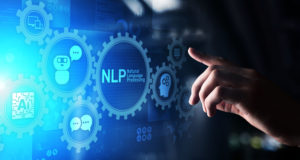
Natural Language Processing: The Next Frontier in AI for the Enterprise

(Wright Studio/Shutterstock)
The power and practicality of artificial intelligence is largely undisputed. However, one of its longest-standing difficulties continues to be human language. A misspelled or misused word can frustratingly turn a chatbot conversation on its head, whereas a live service agent would have been able to prevent the mistake. Once computers can authentically understand human language, our business communications will completely transform. Machine learning (ML) and natural language processing (NLP) present us with a way to get there.
NLP and Why It Matters
NLP is a branch of AI which enables computers to understand, write and speak languages just like humans. NLP has a number of use cases, including search engines, translation services, and chat or voice bots. Almost half of today’s businesses use applications that are powered by NLP, and one in four businesses plan to begin using NLP technology within 12 months.
In most cases, NLP models rely on ML to comprehend written or spoken language. In this, the models learn much like humans do: using ML, they collect audio or written terms from humans, interpret the data, and can respond in the same language. Leveraging this process, some NLP-equipped AI algorithms can outperform humans in understanding the meaning of a text, or searching for the answer to a random question in over 100 languages. This level of proficiency has exciting implications for the business world. With NLP, searching for a product or service, or asking a brand a question can be quick and easy, no matter what language you speak or even whether you know how to phrase what you’re looking for.
Use Cases of NLP
Chatbots are one of the most straightforward applications of NLP. With users’ screen time up higher than ever (4.2 hours a day in 2020), predominantly on messaging apps, it’s critical that businesses leverage chatbots and AI assistants to be ready and able to respond to their customers around the clock.
NLP can help chatbots better understand customer inquiries and respond accordingly. This allows the bots to be strategic tools for a business’ omnichannel communications by learning from previous customer interactions to carry out a large volume of conversations in an efficient manner — all while reducing human errors and time consumption in customer service.
Additional use cases of NLP include:
- Intelligent search: The majority of search engines work only with specific keywords rather than a true understanding of what a user is searching for. Intelligent search enabled by NLP allows users to ask questions, and the engine will pore over documents for an answer. Businesses should be looking to use their unstructured, textual data to better serve their customers via an intelligent search engine.
- Automated topic and skill detection in chat: NLP-powered chatbots can make conversations more efficient by automating skills and detecting topics so they can hand off the conversation to the right agent if need be. For example, if a user is frustrated, NLP can detect that through their messages and respond accordingly to diffuse the situation and offer the customer the correct assistance.
- Live agent support: Even when a chatbot is not leading a conversation with a customer, NLP can boost the efficiency of a conversation. NLP can create response suggestions based on the conversation and customer context so live agents don’t need to type out individual answers. This can streamline efforts, allowing businesses to scale their customer service processes while ensuring all customers are receiving the attention that they need in a timely manner.
Benefits of NLP
Large enterprises have the greatest potential to benefit from ML and AI due to their substantial pools of data, as well as the available budget for software that can process it. NLP can provide value to businesses of all sizes by allowing them to analyze and process unstructured data of any volume.
Due to its wide range of applications, NLP has a wide range of benefits for businesses who choose to incorporate it into their business strategy. These include (but are not limited to):
- Boosting customer experience: NLP’s proficiency at streamlining processes means that live agents have more time to cater to urgent and complicated customer needs. For frequently asked questions, NLP can suggest responses, search texts for an answer, or even automate conversations via a chatbot which leads to quicker response times and more satisfied and loyal customers (and less churn).
- Ensuring customers’ needs are met: Many companies ask customers to fill out surveys about a product they purchased or a service they receive. Once those are completed though, it can be costly and difficult for many businesses to actually analyze this data. NLP takes the headache out of parsing through reviews, and turns them into real-world, actionable insights — enabling businesses to tweak their offerings per customer feedback so that customers are more satisfied in the future. This responsiveness can sometimes be the difference between a repeat customer and having to fight to acquire a new one.
- Protecting employees and customers: Phishing attacks are on the rise and it can be difficult for many businesses to ward them off. Certain NLP algorithms can identify messages that may be fraudulent, enabling businesses to filter out dangerous messages from their employees and their customer’s inboxes.
Human language is complex and it can be an enigma — even for humans. Investing in NLP can skyrocket the ability of a business to effectively and seamlessly engage with customers globally, a particularly critical offering as our world becomes increasingly digital.
About the author: Pieter Buteneers is an industrial and ICT-electronics engineer. He started his career in academia, first as a Ph.D. student and later as a postdoc, where he did research on Machine Learning, Deep Learning, Brain Computer Interfaces and Epilepsy. He won the first prize in the biggest Deep Learning competition of 2015 together with a team of machine learners from Ghent University: the National Data Science Bowl hosted on Kaggle. In the same year, he gave a TEDx talk on Brain Computer Interfaces. In 2019 he became the CTO of Chatlayer.ai, a platform to build multilingual chatbots who communicate on a human level. In 2020 Chatlayer.ai was acquired by Sinch and now Pieter leads all Machine Learning efforts at Sinch as Director of Engineering in ML & AI.
Related Items:
One Model to Rule Them All: Transformer Networks Usher in AI 2.0, Forrester Says
[wpsr_share_icons icons="twitter,facebook,linkedin,reddit,email" icon_size="40px" icon_bg_color="" icon_shape="circle" hover_effect="opacity" sm_screen_width="768" lg_screen_action="show" sm_screen_action="show" page_url="https://www.bigdatawire.com/2022/02/23/natural-language-processing-the-next-frontier-in-ai-for-the-enterprise/" page_title="Natural Language Processing: The Next Frontier in AI for the Enterprise" page_excerpt="
The power and practicality of artificial intelligence is largely undisputed. However, one of its longest-standing difficulties continues to be human language. A misspelled or misused word can frustratingly turn a chatbot conversation on its head, whereas a live service agent would have been able to prevent the mistake. Read more…
" share_counter=""]




























